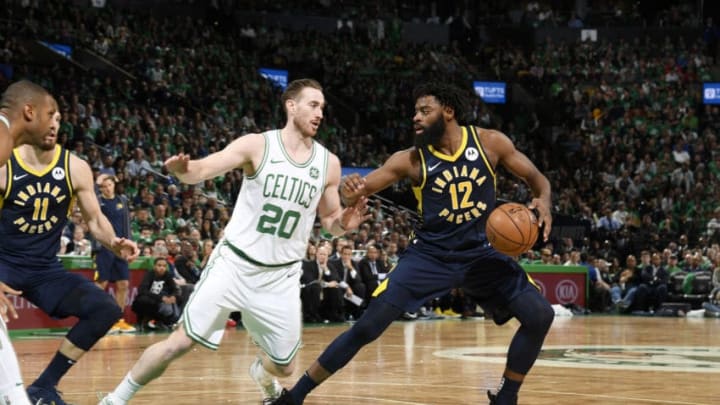A tough final minute took a win away from the Indiana Pacers in Game 2. What can we take away from a game like that?
WIth 50 seconds left in Game 2 against the Boston Celtics, the Indiana Pacers were winning. Then, they lost. That’s a very anticlimactic way to explain the end of that game, but that is what happened, and it emphasizes how close the Pacers were to stealing a game in Boston.
They didn’t, though, and there is no such thing as moral victories in the postseason. You win or you go home. The game is a loss at face value and underneath since the end of the season is so close.
But the Pacers played better than they did in Game 1, which IS a big deal to me. That’s not a moral victory, that’s an observation that serves to provide context for the teams play going forward.
And speaking of going forward, the team will have to be better in Game 3 than they were in Game 2 if they want to win. What can we take away from Game 2 that could reveal how the team gets better? Let’s examine.
The Indiana Pacers are willing to make adjustments.
This is a “duh” statement when presented this way. Every team should make adjustments in the playoffs. It is how you win games.
But the Pacers made big adjustments. They left their comfort zone, which is telling for a team that had a fairly rigid rotation and strategy throughout the season.
First and foremost, they switched much more frequently on defense than they normally do. In Game 1, Indiana was conceding too many drives and giving up too much out of screen/handoff action. That was unacceptable.
Instead, they decided to switch more often to cut off those drives. Kyrie Irving didn’t care, it doesn’t matter who is guarding him. But most other Celtics felt the pressure and were less effective offensively than they were in Game 1.
Additionally, the rotation was slightly altered. The starters played more minutes than in Game 1 and TJ Leaf was cut from the rotation in favor of a small dose of Aaron Holiday. The Pacers basically broke even in those minutes, which is all you can want with a rookie guard on the floor.
The Pacers will need to make more adjustments in Game 3 to get their big men going and slow down some of Boston’s offense. But the strategic moves they made in Game 2 were a good start.
Kyrie Irving is unreal.
There was a pre-series narrative about the Indiana Pacers having no chance since the Celtics have more star power on the floor. Between Irving, Tatum, and Horford, it seems like the Celtics have the three best players in the series, including the best player by a mile in Kyrie.
Irving showed that last night. It didn’t matter what coverage was thrown at him or what set the Celtics ran, Irving was hitting the shot he got:
After a mediocre Game 1, Irving finished Game 2 with 37 points on 15/26 shooting. And he had 6 rebounds. And 7 assists. He is simply incredible, and the Pacers don’t have answers for him that don’t compromise literally everything else they do on the defensive end. They are going to have to find better ways to slow him down. Perhaps a sacrifice to the basketball Gods?
Myles Turner’s defense is incredibly important.
The Celtics big run in the 4th quarter started with Domantas Sabonis in the game. Or, more importantly, Kyrie Irving acknowledged how effective Turner was defending the paint prior to that moment.
“He was making me miss at the rim, and that’s what you want to do as a shot blocker if you can’t get a hand on it,” Kyrie Irving told John Karalis of Mass Live. “He’s coming over every single time and there were a few plays where I’m getting to the rim and I’m wondering where Myles is coming over and he just makes me miss.”
With Turner on the floor, the Indiana Pacers outscored the Celtics by 6 points in a game that the Pacers lost by 8. Turner was immensely important thanks to his defense, and I wouldn’t be surprised to see his minutes increased in Game 3.
The Indiana Pacers improved from Game 1 to Game 2. If that trend continues and combines with home-court advantage, they could come away victorious from Game 3.
